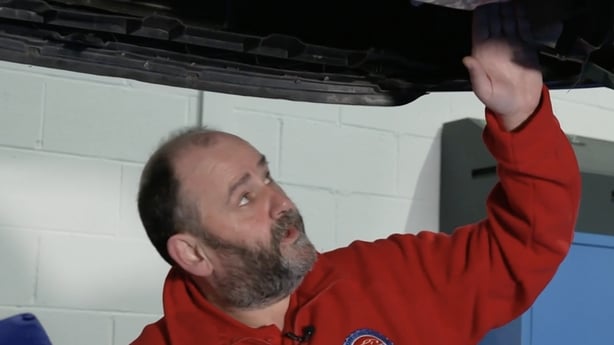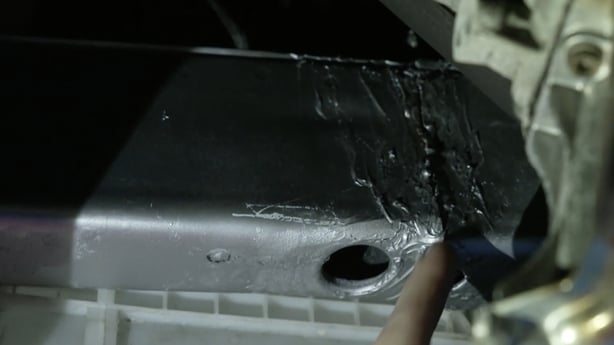When Dubliner Esther Woodley bought a 2017 Volkswagen Polo last September from a garage, she was reassured by two things. She had dealt with the garage before - they had done minor repairs on a previous car - and it had a recent NCT cert. In fact, the car had passed the test only three days earlier.
"I felt I could trust the garage," she told Prime Time, and she felt she could trust the NCT.
"I would never have purchased that vehicle if it hadn't passed an NCT," Ms Woodley said. She paid €7,500 in cash for the car, plus her old car as a trade-in.
On the outside, the purchased car looked perfect to the untrained - and even the trained - eye, but underneath it told a different story. Unknown to Ms Woodley, the vehicle had been badly damaged in an crash less than a year before she bought it, and very poorly repaired.
Just after Ms Woodley bought the car, she noticed warning lights on the dashboard. The garage promised to fix it, but then stopped communicating. She called down to the premises.
"They were gone and there was new signage, new people, and it was just such a horrible sinking feeling," she said. "They disappeared, they completely disappeared."
Thinking that the dashboard lights flashing may be a sign that the car's computerised diagnostic system was faulty, she hired a motor engineer to have a look.

He took the car for an inspection and returned with bad news.
"When I opened the door to him, he looked a little bit down on himself and he said, 'the centralised computer is the least of your worries… It's completely unroadworthy'."
The engineer warned Ms Woodley not to drive the car. He was right to do so.
Another auto engineer, Noel Maher, Managing Director of Automotive Technical Consulting, inspected the car for Prime Time.
He found numerous problems - the diagnostic system was faulty, the battery was insecure, there was problems with the headlights, damage to the car's subframe, and other issues. Yet, the most glaring of the car's problems were the chassis legs.
The driver side chassis leg "has been cut back around 12 inches back from the front of the chassis leg, and there is no welding there. We can see that somebody put one or two spot welds on it and then used silicon to disguise the repair that should have been carried out," Mr Maher said.
The passenger side chassis leg had been "crushed and … very poorly repaired," he added.
"I would consider it a hazard, a danger to any occupants that are in it, and to other road users. If this vehicle was in a further accident, the front ... would collapse very quickly. The engine and gearbox would be pushed back into the bulkhead of the vehicle, and that would cause injury to the occupants inside in the vehicle."
So how did this car pass an NCT?
"I don't know how anyone could miss it," said Mr Maher. "It's very much visible."

The business that sold the car is the now-defunct Premier Motors Auto Repairs, not to be confused with other entities of a similar name. It operated at JFK Road in Dublin - its former premises is now occupied by an unconnected car business.
The owner of Premier Motors Auto Repairs, a 33-year-old Dubliner, who we are not naming, told Prime Time that details of any previous damage to a vehicle would have been written on the customer’s receipt.
However, there is no such mention on Ms Woodley's receipt which was signed by him.
On the contrary, pre-purchase text messages sent by Premier Motors Auto Repairs, painted a picture of a car in excellent condition. In one text message sent prior to purchase, the owner told her that "the car is like new".
Another text the following day stated, "as I said car is like new and some are going for 10k to 15k on donedeal so you will be happy with it when you see it".
Misleading Ms Woodley in this way would appear to be a clear breach of consumer law.
The owner acknowledged making repairs to Ms Woodley's car but told Prime Time he wasn't sure whether the chassis-leg welding was done by his garage. He maintained repeatedly that the car "was roadworthy" because it passed an NCT.
After Ms Woodley complained officially to NCT operator Applus over the fact that her dangerous car had passed the NCT, an NCT auditor, alongside an expert from the AA, took her car for examination.
They found numerous problems - including the faulty chassis legs - and said it should not have passed the NCT.

In fact, the car had undergone three NCT tests last year while in the hands of Premier Motors Auto Repairs, a test on 21 August, which the car failed, a test on 19 September, which it failed due to an issue with wheel alignment, and a test it passed on 24 September.
According to correspondence from Applus to Ms Woodley, the NCT auditor found serious flaws in all three tests, including the 21 August test, which the auditor said should have failed on at least three grounds - damage to the driver side chassis leg and the front lower subframe as well as the issue it failed on - damage to the passenger-side chassis leg.
They also stated that "the warning lights showing on the dashboard should have been noted on the report".
Car buyers can do a check on a vehicle's history that usually costs around €30. Ms Woodley did not do this.
"If it was a private individual, I'd do a check and I'd probably get a mechanic or an engineer to come out and view the car. But the fact that I was buying from a garage, I did feel there was a certain safety in that, I felt there'd be a certain integrity with the garage. They want 'return business'," she said.
Had she done a vehicle history check the car would have been flagged as what is known as a Category-C write off.
Category-C is a designation that insurance companies apply when the cost of repairs exceeds the value of a vehicle. Category-C vehicles can be put back on the road once repaired, but for the unscrupulous car dealer it can be easy to deceive the average buyer about the condition of any vehicle.
Complaints from the public relating to the motor trade are a significant focus for the State's Competition and Consumer Protection Commission (CCPC).
"We get about 40,000 contacts through our helpline. Every year, about 5,500 of them relate to cars. So, it's the biggest single issue that people contact our helpline on," said Patrick Kenny, member of the CCPC.
And if you have been misled by a dealer what are your rights?
"You can go back to the trader and say, 'I've been misled. I want my money back'. And ask them to take the car back," Mr Kenny said. "If that doesn't happen, then you can ring our helpline and make a statement and we will then investigate. And if the facts back that up, we will decide to bring a court case."

Mr Kenny said the CCPC brings around three to five car-related cases a year.
"It's a mixture of clocked cars, selling an unsafe car," he said adding that the CCPC also carry out inspections of dealers.
Mr Kenny laments the sentencing in the courts for those convicted of car crime.
There have been a "number of people who have got jail sentences, but up to now [those sentences have] always been suspended."
"I won't comment on the decision of judges," he said, but if someone has "deceived a consumer" by selling an unsafe car "that then is a societal issue because we're all traveling on the road with these unsafe cars. I think that's a crime that deserves quite a significant tariff in terms of jail time."
Applus has revoked the NCT certificate on Ms Woodley's 2017 Polo, meaning she cannot drive the car on the public road.
Also, she can't pursue a garage that no longer exists for a refund, so she wants Applus to compensate her.
"I do feel that they're responsible for this. I would never have purchased that vehicle if it hadn't passed an NCT," she reiterates. "You're required to have a valid NCT on a vehicle to get your car insured. I thought I had a valid NCT on a roadworthy vehicle."
Applus declined as request from Prime Time to do an interview. In a statement, it said that last year it inspected over 1.7m vehicles, that almost half failed the initial test and over 128,000 were deemed unsafe to be driven from the test centre.
It also said that "we would urge anyone looking to purchase a second-hand vehicle to use a qualified mechanic to support them in the decision-making process."
Ms Woodley sees a contradiction in the latter position.
"The NCT and the RSA [Road Safety Authority, which supervises the NCT] don't really hold themselves accountable or responsible for this. They try to put the onus back on, in my case, a purchaser, to get a pre-purchase test with a mechanic. But at the same time, they're telling me that their mechanics are fully trained and they're uber-trained going into an NCT centre."

The RSA told Prime Time that it has "requested that Applus investigates how [Ms Woodley's case] occurred and that any additional training and standards measures required are identified and implemented."
Figures from the RSA, which supervises the NCT, show that your chances of success at an NCT test vary significantly depending on where you test your car.
In 2023, 61% of cars tested at Abbeyfeale and Dublin's Deansgrange passed first time. At Tullamore the figure was 60%. Whereas in Navan only 45% passed first time, in Na Doirí Beaga in Donegal it was 44% and at the Cavan NCT centre it was 41%. So, motorists had roughly a 50% better chance of first-time success at Abbeyfeale NCT centre compared to Cavan.
The disparity perplexes the CCPC’s Patrick Kenny.
"I would think if I was the regulator that was in charge of this, that would concern me ... if the test is a valid test, you'd expect only random differences between centres."
Regarding Esther Woodley's car, Applus has firmly rejected her request for compensation. She is now considering suing.
"The NCT is a national organisation. And when they do a test on a car, if there's serious damage or something unsafe with a vehicle, it's supposed to be failed. So, at the end of the day - I'm not forgetting about the dealer by any means - but the NCT are very responsible for passing that vehicle out," she said.
"It's a public safety issue, a very serious public safety issue."






